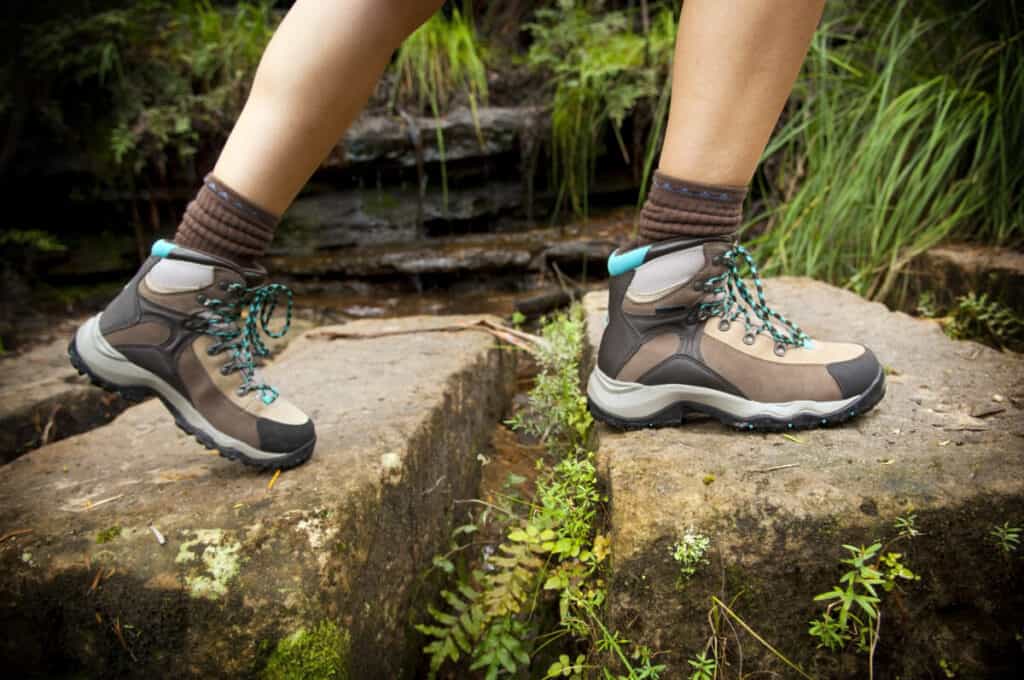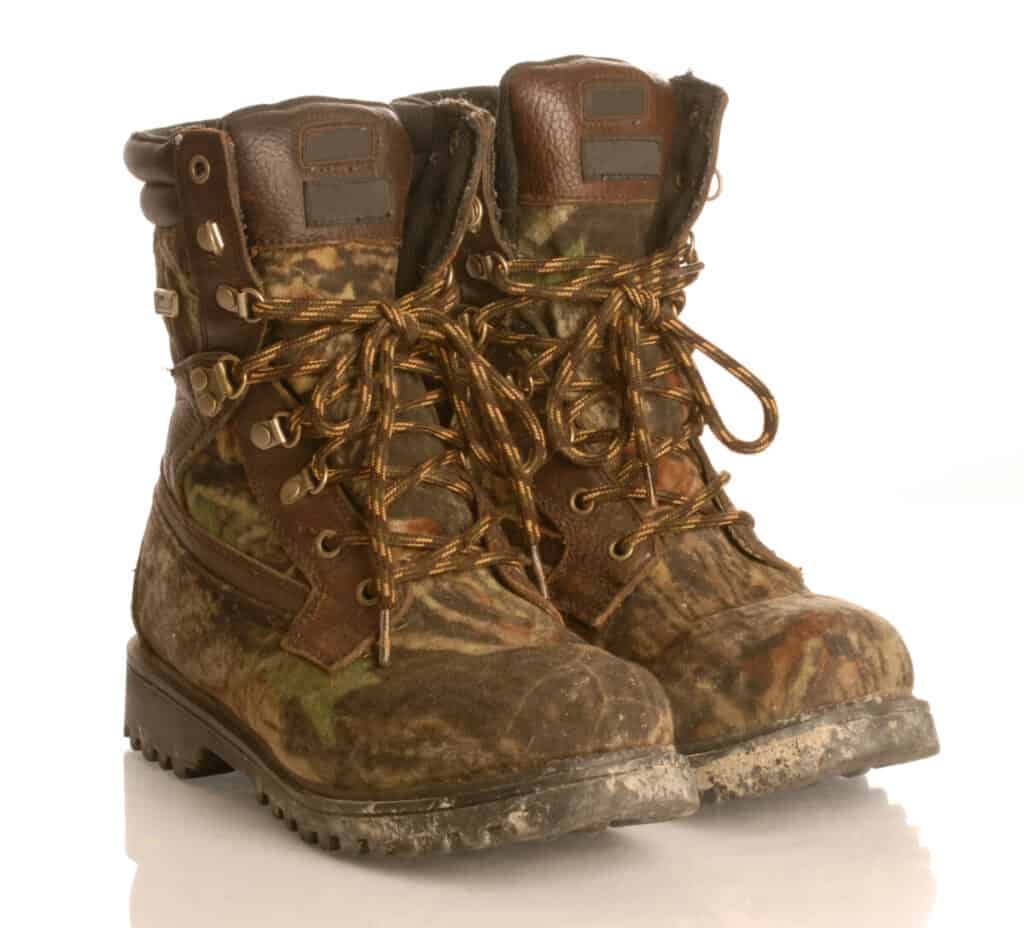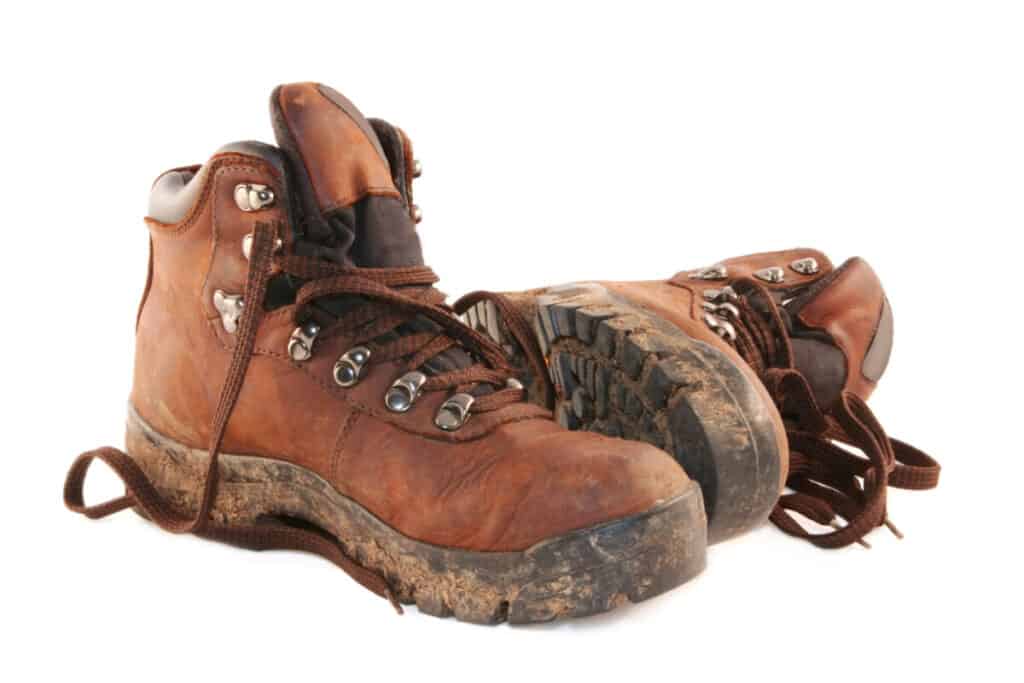Some stores specialize in hiking boots and some stores specialize in hunting boots. Others are more general and may offer a variety of both types. If you are just looking for a solid outdoor boot, is there really a meaningful difference?

Hiking boots are a lighter construction than hunting boots with lower collars for the purpose of putting on more miles, and hunting boots will lean toward heavier construction for the purpose of walking in off-trail conditions.
The materials and construction for hiking boots and hunting boots are very similar. In fact hiking boots and hunting shoes look similar at first glace, and so it’s easy to think that if you get either type of boot that it will work perfectly for both activities. Well… not exactly. Read on to find out why not.
By the way, as an Amazon Associate, I earn when buying qualified products through links on my site.
Differences Between Hiking Boots and Hunting Boots
Both types of boots will have good, sturdy soles, either leather or synthetic uppers, and offer either slight ankle support or massive ankle support. The amount of insulation and waterproofing will depend on the type of hiking/hunting boot.
But there are some big differences. I took data from the top 5 hiking boots and hunting boots from Cabelas to help aid the comparison:
| Insulated | Purpose | Brand and Model | Weight |
| No | Hiking | Columbia Newton Ridge | 1.9 lbs |
| No | Hiking | Merrell Reflex All-Leather Mid Waterproof : Hiking Boots for Men | 2.6 lbs |
| No | Hiking | Merrell Moab 2 Vent Mid Hiking Boots for Men | 1.9 lbs |
| No | Hiking | ROCKY Outback GORE-TEX 8” Hiking Boots for Men | 2.8 lbs |
| No | Hiking | Cabela’s Rimrock Mid GORE-TEX Hiking Boots for Men | 3 lbs |
| Yes | Hunting | Cabela’s Iron Ridge 800 GORE-TEX Insulated Hunting Boots for Men | 4.25 lbs |
| Yes | Hunting | Cabela’s Inferno Insulated Waterproof Hunting Boots for Men | 5.7 lbs |
| Yes | Hunting | Cabela’s Iron Ridge GORE-TEX Insulated Hunting Boots for Men | 4.25 lbs |
| No | Hunting | Cabela’s Iron Ridge GORE-TEX Hunting Boots for Men | 3.9 lbs |
| Yes | Hunting | ROCKY BearClaw 3D GORE-TEX Insulated Hunting Boots for Men | 5.2 lbs |
Weight
Hiking boots are, in general, more lightweight than hunting boots.
For example, 5 of the most popular hiking boots at Cabelas weigh 2.44 lbs on average, while 5 of the most popular hunting boots at Cabelas weigh 4.66 lbs on average. The most popular hunting boots weigh twice as much as the most popular hiking boots.
That’s just at Cabelas but as you look you’ll see the same. Why is that?
Insulation
Most hiking boots are geared more toward summer travel because the vast majority of people will do most of their hiking in the warmer months. Hunting, on the other hand, is often done in the shoulder seasons or even in winter-like conditions, and thus hunting boots tend to have insulation which adds a bit of weight.
If you’re looking for hiking boots with insulation, you need to be looking for “winter hiking boots”, or “snow hiking boots” or even “mountaineering boots”. Hiking boots with insulation are almost a completely separate category from standard “hiking boots”.
Boot Height
The other factor that affects weight is the height of the boot. Both styles have lots of boots that rise to your ankle or just above it, but hunting boots are often very tall and rise as high as mid-calf. You’ll rarely see that in a hiking boot, and as you can imagine, that type of style will definitely add weight.
There’s a couple reasons why hunting boots are higher–one of the main being that since hunters are almost by definition off-trail, they are going to be in brush and there are a lot of critters that bite at the ankles–so extra protection is a big plus.

Purpose
Those are some of the more obvious physical differences. Let’s consider the difference in overall purpose for each type of boot:
Hiking Boot: Hiking is all about walking. The goal is to rack up the miles to get to your destination, whether that’s a high peak or a beautiful pristine lake, or even the next town on a long thru-hike of say, the Pacific Crest Trail. The boots are designed with these activities in mind. They need to be comfortable, provide good traction and good support, and be durable and strong while keeping the weight to a minimum.

Hiking isn’t always on a trail but it often is. That’s why hiking shoes are a thing and you’ll never see a hunting shoe.
A hiker can get away with not wearing boots at all! “Hiking shoes “ don’t come up to the ankle (and it’s what I prefer to wear honestly). But it’s more obvious that this only works because as a hiker I hike on trails 95% of the time.
Hunting Boot: Some hunters will cover a lot of ground on foot while out on the hunt, but others will prefer to keep the miles low and may spend quite a bit of time in the deer stand or the duck blind. However many miles a hunter chooses to travel, it’s likely they will be traveling those miles on challenging off-trail terrain. For these reasons, hunting boots are designed to be extra sturdy and to keep your feet warm and dry.
A hunter may stay in the same location without moving for hours. Insulation is incredibly important for this reason. Hikers get to move around to warm up while hunters in many situations can’t.
The Look
Probably the only other difference between hiking boots and hunting boots is the look. While they can look very similar in many cases, hunting boots will often have a camouflage pattern that is not used for hiking boots. You will rarely if ever, find a splash of non-earth-tone color on a hunting boot, including the laces. Hunter orange is typically used on jackets and hats, but not on footwear.
Hiking boots are usually earth-toned as well. They certainly aren’t like running shoes or basketball shoes which can be pretty wild, but they will occasionally have laces or maybe an emblem or some other swath that has a little pop to it.
Why do hiking boots have a bit more style? Unlike hunting, hiking can sometimes take place in a more urban setting, and some people want their footwear to go straight from the trail to the mall or the brewpub, and not look out of place in either one.
When to Choose a Hiking Boot Or a Hunting Boot
How intense is your outdoor activity going to be? Are you mostly going to be on established trails, or are you planning on testing yourself off the trails, through the streams, up the ravines, and into the thickets in all kinds of weather?
If you’re staying on the trails, then a hiking boot is going to be a better bet. You’ll appreciate the lighter weight and the ankle support for those rocky sections. They’ll do a better job of keeping your feet cool as well, but of course, nothing can beat taking off whatever you’re wearing on your feet, and dipping those barking dogs in a cool stream!
That’s not to say a trail is easy terrain. But what’s crucial is that trails don’t usually have brush (sometimes grass), otherwise it’s not much of a trail.
If you enjoy really getting to know a landscape intimately, at some point, you’ll need to go off-trail. Right away, you’ll encounter rocks, sticks, thorns, weeds, mud, snakes, cacti. You name it! Flip-flops need not apply! In fact, the more protection you’ve got, the more confident you’ll feel, and you can begin to increase your knowledge of the terrain even in rough weather.
If you’re spending significant time off-trail (like if you’re hunting), then you’ll appreciate the extra protection with hunting boots.
Additionally, hunting boots have that extra insulation. Another thing to consider is if you are going to be staying in one spot in the wilderness for long periods of time or if you are traipsing through snow, then hunting boots make a lot of sense.
Do You Really Need Hunting Or Hiking Boots?
Both hiking boots and hunting boots can be expensive. Sure, there are cheap versions of each, but they’re not very good quality and you will likely be disappointed. Good hiking or hunting boots will cost $175-$300 and sometimes even more. If you’re just getting started, are these boots really necessary?
The short answer is no – especially if you plan to stick to the trails. In that case, all you really need is a decent pair of walking shoes or really whatever you’ve got as long as they are comfortable and have at least some support and some traction. Again, leave the flip-flops for the backyard barbeque.
A few other types of shoes you shouldn’t bring to the trail would be heels, clogs, and any light, flimsy canvas shoes with no support. Anything else is fair game – no hunting pun intended.
In fact, if the only outdoor shoes you have is a pair of running shoes, you might want to check out my article where I talk about the pros and cons of hiking in running shoes.
One of the greatest things about hiking, and one of the biggest reasons I got into it, was that there is almost no up-front cost. Even if you’ve never taken a hike in your life, it’s possible to do a simple day-hike in whatever shoes and clothes you already own plus a small pack with a water bottle and a snack.
You can certainly choose to expand your gear from there, and what you want to do will drive those decisions, but even long-time hikers don’t necessarily have tons of gear. In fact, ultralight hikers attempt to hike with as little gear as possible. Remember, it all has to fit in the pack and you have to carry it!
A Quick Tip About Soles In Choosing A Hunting or Hiking Boot
Almost any shoe will give you traction on dry surfaces, but in both hiking and hunting, you’re going to encounter wet weather and slippery surfaces. Cold can also make the rubber on your boots harder, which can reduce their ability to grip. If you’re going to be traveling in wet or cold weather, be sure to get boots that have a slightly softer rubber on the sole. They might wear down a little quicker, but they might also save you from having an unplanned swim in the creek!
Generally speaking, lighter weight hiking boots or hunting boots will offer softer soles with better grip. The lighter boot will be more flexible and the sole will conform to the surface better giving you more traction. Heavier boots, such as mountaineering boots tend to be stiffer. They will have a harder sole and will be less nimble and potentially a little slicker on wet or cold surfaces.
There is a tradeoff between traction and durability for boot soles.
